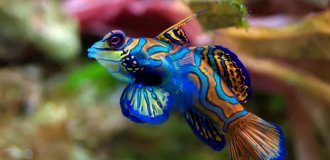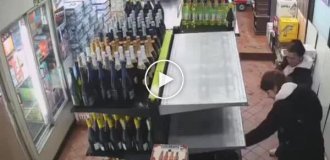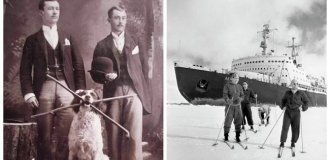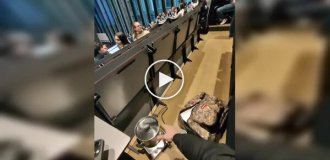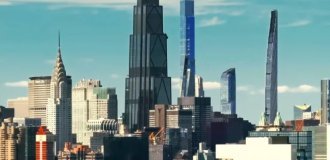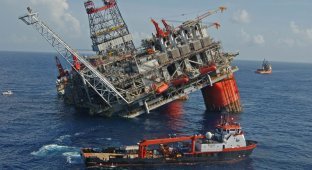How an oil platform works (47 photos)
Tour of the drilling platform!

Workers and personnel travel to the village of Nogliki, a stronghold of SE in the north of Sakhalin, by train, in the company's private carriage. An ordinary compartment car - nothing special, although a little cleaner than usual.

Each passenger is given the following lunch box:

Upon arrival in Nogliki, everyone is met by a supervisor and decides what to do next - either a temporary camp, or an airport - by helicopter, or (if the weather is unflyable) by boat. We were sent straight to the airport. To fly in a helicopter, you must take a helicopter rescue course (HUET) in advance in Yuzhno-Sakhalinsk. During this training, they put on special thermal suits equipped with a breathing system and turn you upside down in a swimming pool, in a simulated helicopter cabin, but that’s another story again...
At the airport, everyone undergoes a personal search (including dog handlers)


...a pre-flight briefing describing the situation if the helicopter still crashes and putting on rescue suits.

The suits are terribly uncomfortable, but if the helicopter crashes, they can keep you afloat and keep your body warm until rescuers arrive. True, if you get out of a sinking helicopter in this suit...
The platform is located 160-180 km from Nogliki. The helicopter covers this distance in 50-60 minutes, flying all the time along the shore to minimize the risk of falling into the water, and along the way flying another platform of the Sakhalin-2 project, Molikpaq.
After landing on the helipad, you go down to the induction room:

...and then you are given a bunch of boring safety training (HS) and assigned to cabins.

All! Now you are on an offshore oil production platform, a piece of land in the sea, and there is no escape from this fact.

How to work here?
The PA-B platform operates around the clock and life here does not stop for a second. 12 hour day shift and 12 hour night shift.

I worked during the day, although some say that at night it is calmer and there is no daytime bustle. All this, of course, is addictive and after a couple of days you already feel like a cog in a huge mechanism, and an even better comparison is like an ant in an anthill. The worker ant woke up at 6 in the morning, had breakfast with what the ant cook had prepared, took the work order from the ant supervisor and went to work until the evening, until the replacement ant came to replace him... At the same time, it’s like... then everything unites.
After 3 days I already knew almost everyone by sight...

and felt as if we were all part of one whole, practically relatives.

But there are 140 people working on the platform (that’s exactly how many people should be on the platform and not one more, so that the lifeboats “alpha”, “betta” and “gamma” could evacuate everyone. That’s why we were transferred to spend the night on the ship for a couple of days). A strange feeling... it all felt like one continuous, continuous day.

I woke up, went to the dining room, greeted the person from the night shift, for whom it was dinner, he went to bed, and in the evening we met again in the dining room, only he was already having breakfast and I was having dinner. For him it was already a different day, but for me it was the same! And so again and again... a vicious circle. So day after day, night after night, a week passed.
How to live here?
In principle, the platform has all the conditions for a comfortable stay and free time. All conditions have been created here so that a person does not bother himself with everyday problems, but completely devotes himself to two activities - work and rest.
Once you have been assigned to a cabin, you can be sure that upon arrival there will be a crib waiting for you with fresh bed linen already made up, which is changed every few days. Cabins are cleaned and vacuumed regularly. They come in 2 types: “2+2” and “2”. Accordingly, for 4 people and for two.

As a rule, half of the residents work on the day shift, the rest on the night shift, so as not to interfere with each other. The furnishings are spartan - a minimum of furniture due to the lack of free space, but everything is very ergonomic and efficient. Next to each room there is a shower with toilet.
Dirty items are washed in the laundry room.

When you check in, you are given a mesh bag with your cabin number written on it. You put your dirty laundry in it, and then you just bring it to the laundry and after a few hours, fresh-smelling and ironed laundry awaits you.

Work overalls are washed separately in special solutions; household chemicals do not remove oil and other associated amenities.
On each floor of the residential module there is a point with free Wi-Fi (naturally, all social networks are blocked). There is also a computer class - 4 computers for general Internet access and other needs. They are usually used by washerwomen to play solitaire.
There is also a small gym (by the way, quite good):

billiard:

table tennis:

cinema hall:

(the guys attached a Playstation to the projector and raced at dinner) in which in the evening they show something from the newly replenished DVD collection.
A few words about the canteen...

She is o.f.i.g.i.g.e.n.n.a. During my week on the platform I gained 3 kege.

This is because everything is very tasty, unlimited and free =)


During the week, I don’t remember the menu being repeated, but on Oilman’s Day it’s just a celebration of the belly: a bunch of shrimp, scallops and Baltic “nulevka” are worth the batteries!

Smoking on the platform is only allowed in strictly designated areas.

Moreover, each such room has a built-in electric lighter, since the use of lighters and matches is prohibited.

It seems that they cannot be transported and will be confiscated at Noglik airport. It is also prohibited to use cell phones, but except for the residential module and only as an alarm clock. And in order to photograph anything outside the residential module, you will have to write out a special outfit, go through gas permit training and take a gas analyzer with you.
As I already mentioned, for the first few days we lived on the support ship "Smit Sibu" due to the fact that there is a limit of people on board due to the limited number of places in the lifeboats in case of emergency evacuation.

"Smit Sibu" constantly runs from "Molikpaq" to "PA-B" in case of emergency. To reload onto a ship, a “frog” device is used:

This thing really looks like a frog - a non-sinking cabin, with an iron base and chairs inside. Before each transfer, you again need to put on survival suits.

Frog is hooked onto the crane and dragged onto the ship. The sensations are quite sharp when you are lifted to the height of the 9th floor in an open cabin swaying in the wind and then lowered on board. For the first time, I couldn’t hold back a cry of delight at this free “attraction.”

Unfortunately, photography is strictly prohibited in the area 500 meters from the platform - it’s a security zone, and I don’t have any photos from the frog with a view of the platform. There was nothing particularly interesting on the ship - it didn’t rock much, for breakfast we were fed fresh caviar, boiled eggs and macaroni and cheese, and the sockets everywhere were 120 volts and flat, like in Japan. There was always the feeling that you were a guest, in someone else's house. Maybe the crew created such a mood...

In the evening, the only entertainment was to walk around the upper deck and watch movies.

For the first time I saw a sunset on Sakhalin from the sea, when the sun goes behind the island.


And at night they came very close to Molikpak. Millions of seagulls were circling around, and the torch was burning at full power - the pressure was probably being released. I managed to click a piece of the platform from the porthole:

Well, in the morning we again had to put on rescue suits, climb into the “frog” and back onto the platform.

On one of the last days, I managed to get permission to take photographs at the helipad

... and on the upper deck. Flare system with pilot burner:

Many people ask why so much associated gas is flared, because it can be used for various purposes! Firstly, not a lot, but a small part. And secondly, do you know why? So that in the event of an emergency it is possible to safely relieve gas pressure through the flare system, burn it and avoid an explosion.
And this is the drilling module. It is from this that the drilling process is carried out, see how big it is!

The helicopter picking up personnel comes in to land:

The scheduled loading of passengers flying to Nogliki is underway:



The way back home seemed much faster and shorter. Everything was exactly the same, only in reverse order. Helicopter-train-Yuzhno-Sakhalinsk...






